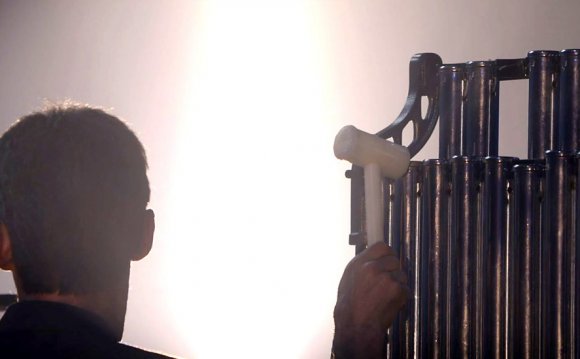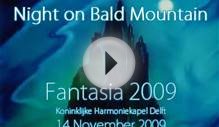
Night on Bald Mountain (Russian: Ночь на лысой горе, Noch' na lysoy gore), refers to a series of compositions by Modest Mussorgsky (1839–1881). Inspired by Russian literary works and legend, Mussorgsky composed a "musical picture", St. John's Eve on Bald Mountain (Russian: Иванова ночь на лысой горе, Ivanova noch' na lysoy gore) on the theme of a witches' sabbath occurring on St. John's Eve, which he completed on that very night, June 23, in 1867. Together with Nikolay Rimsky-Korsakov's (1867), it is one of the first tone poems by a Russian composer.
Although Mussorgsky was proud of his youthful effort, his mentor, Miliy Balakirev, refused to perform it. To salvage what he considered worthy material, Mussorgsky attempted to insert his Bald Mountain music, recast for vocal soloists, chorus, and orchestra, into two subsequent projects—the collaborative opera-ballet (1872), and the opera (1880). However, Night on Bald Mountain was never performed in any form during Mussorgsky's lifetime.
In 1886, five years after Mussorgsky's death, Rimsky-Korsakov published an arrangement of the work, described as a "fantasy for orchestra." Some musical scholars consider this version to be an original composition of Rimsky-Korsakov, albeit one based on Mussorgsky's last version of the music, for The Fair at Sorochyntsi:
I need hardly remind the reader that the orchestral piece universally known as 'Mussorgsky's Night on the Bare Mountain' is an orchestral composition by Rimsky-Korsakov based on the later version of the Bare Mountain music which Mussorgsky prepared for .
It is through Rimsky-Korsakov's version that Night on Bald Mountain achieved lasting fame. Premiering in Saint Petersburg in 1886, the work became a concert favourite. Half a century later, the work obtained perhaps its greatest exposure through the Walt Disney animated film (1940), featuring an arrangement by Leopold Stokowski, based on Rimsky-Korsakov's version. Mussorgsky's tone poem was not published in its original form until 1968. Although still rarely performed, it has started to gain exposure and become familiar to modern audiences.
The original Russian title of the tone poem, Иванова ночь на лысой горе, translates literally as Saint John's Eve on Bald Mountain, usually shortened to Night on Bald Mountain. However, due to several ambiguities, the composition is also known by a number of alternate titles in English.
The Russian word "ночь" (noch) is literally "night" in English, but idiomatically this would refer to the night following St. John's Day, variously observed between June 21 (the summer solstice) and June 25. The night before St. John's Day is usually referred to as "St. John's Eve" in English; Russian does not make this distinction.
Bald Mountain is the most familiar translation of лысой горе in English, and is also the most literal. The adjective "bald" is commonly used in English place names for barren hills, mountains, and other features, and so is also idiomatic. However, because the most familiar use of "bald" describes hairlessness, this part of the title is also known as Bare Mountain. The use of "bald" to describe barren landscapes is common in European languages. In French, the piece is known as Une nuit sur le mont Chauve (A Night on the Bald Mountain); and in Italian Una Notte sul Monte Calvo (A Night on Bald Mountain).
Some performances of the work also insert the article "the" before "Bald Mountain" or "Bare Mountain". Articles are not used in Russian, but are often applied to nouns when translating Russian into languages that regularly use articles, such as English and French. However, because the title of the work refers to a specific place called "Bald Mountain, " an article would not normally be used in English.
Opera project: St. John's Eve (1858)[edit]
A sheet of paper apparently found among Mussorgsky's manuscripts contains the following statement:
Program of the opera St. John's Night, in three acts, after the tale by Gogol, written by P. Boborïkin, in the presence and with the help of Modest Mussorgsky, Yevgeniy Mussorgsky, and Vasiliy. Witness to the proceedings: Miliy Balakirev.
This curious fragment, dated 25 December 1858, has been interpreted as an indication of Mussorgsky's intent to write an opera on the subject of Gogol's short story (Russian: Вечер накануне Ивана Купала, Vecher nakanune Ivana Kupala, St. John's Eve). Gogol's tale contains the elements of witchcraft common to other stories in the collection, but does not feature a witches' sabbath. No further plans for this project were mentioned.
Opera project: The Witch (1860)[edit]
The theme of a witches' sabbath, the central theme in all subsequent Night on Bald Mountain projects, appears to have been derived from the nonextant play The Witch (Russian: Ведьма, Ved'ma, Witch) by Baron Georgiy Mengden, a military friend of the composer. In 1860 Mussorgsky informed Balakirev that he had been commissioned to write one act of an opera on this subject:
I have also received some very interesting work which must be prepared for the coming summer. This work is: a whole act on The Bald Mountain (from Mengden's drama The Witch), a witches' sabbath, separate episodes of sorcerers, a ceremonial march of all this rubbish, a finale—glory to the sabbath... The libretto is very good. There are already some materials, perhaps a very good thing will come of it.
— Modest Mussorgsky, letter to Balakirev, 26 September 1860
However, as with the previous project, it is unknown whether any materials were written down, and, if so, whether they were transferred to subsequent projects.
RELATED VIDEO




 Night on Bald Mountain (Russian: Ночь на лысой горе, Noch' na lïsoy gore) is a composition originally by Modest Mussorgsky (1839–1881). Inspired by Russian literary works and legend, Mussorgsky made a witches' sabbath the theme of a 'musical picture' titled St...
Night on Bald Mountain (Russian: Ночь на лысой горе, Noch' na lïsoy gore) is a composition originally by Modest Mussorgsky (1839–1881). Inspired by Russian literary works and legend, Mussorgsky made a witches' sabbath the theme of a 'musical picture' titled St...








